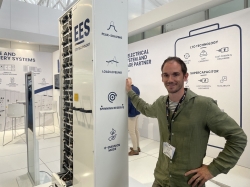2024 show news
DAY 3: LTO electrical energy storage system from Van Meer
Van Meer
 Van Meer is displaying its new, modular electrical energy storage (EES) system featuring LTO chemistry, suitable for a wide range of marine and offshore applications in new and retrofit projects. The company is keen to stress that its lithium-titanate or lithium-titanium-oxide (LTO) battery technology has the advantage of recharging more quickly than other lithium-ion batteries. It says its lithium-titanate battery can be charged and discharged for more than 30,000 cycles, which results in a longer lifetime.
Van Meer is displaying its new, modular electrical energy storage (EES) system featuring LTO chemistry, suitable for a wide range of marine and offshore applications in new and retrofit projects. The company is keen to stress that its lithium-titanate or lithium-titanium-oxide (LTO) battery technology has the advantage of recharging more quickly than other lithium-ion batteries. It says its lithium-titanate battery can be charged and discharged for more than 30,000 cycles, which results in a longer lifetime.
Fully modular, a higher or lower string of voltage can be realized by simply using more or fewer battery modules or supercapacitors. The EES is available in various cabinet dimensions, allowing the system to be built and customized according to the available space. Should future energy requirements increase, it can be easily scaled up.
“We're showing our new product, an electrical energy storage system based on LTO chemistry,” said Louis Michielsens, R&D manager at Van Meer. “We’ve taken a modular approach, so the cabinet can be sized for the different needs of our customers. You might have a lower battery room with less ceiling space, in which case we can make the cabinet lower but wider.”
The company says its LTO batteries have been tested under severe conditions such as puncture, extrusion and short circuit. The results show no smoke, fire or explosion, and a higher safety level than other lithium batteries. “The other main advantage of LTO chemistry, compared with NMC or LFP, is that it is really safe,” continues Michielsens. “The LTO chemistry has also been tested over its lifetime, running for more than 25,000 cycles, with 90% of the discharge running at 2C, which is very good when you compare it with an NMC or LFP alternative. Overall, there’s been a lot of interest – we’ve seen shipbuilders and system integrators stopping by.”